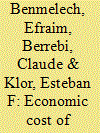| Srl | Item |
| 1 |
ID:
094738


|
|
|
|
|
| Publication |
2010.
|
| Summary/Abstract |
The literature on conflict and terrorism has paid little attention to the economic costs of terrorism for the perpetrators. This article aims to fill that gap by examining the economic costs of harboring suicide terror attacks. Using data covering the universe of Palestinian suicide terrorists during the second Palestinian uprising, combined with data from the Palestinian Labor Force Survey, the authors identify and quantify the impact of a successful attack on unemployment and wages. They find robust evidence that terror attacks have important economic costs. The results suggest that a successful attack causes an increase of 5.3 percent in unemployment, increases the likelihood that the district's average wages fall in the quarter following an attack by more than 20.0 percent, and reduces the number of Palestinians working in Israel by 6.7 percent relative to its mean. Importantly, these effects are persistent and last for at least six months after the attack.
|
|
|
|
|
|
|
|
|
|
|
|
|
|
|
|
| 2 |
ID:
175733


|
|
|
|
|
| Summary/Abstract |
This paper provides the first systematic analysis of the link between countries’ economic, political, and social conditions and the global phenomenon of ISIS foreign fighters. We find that poor economic conditions do not drive participation in ISIS. In contrast, the number of ISIS foreign fighters is positively correlated with a country’s GDP per capita and Human Development Index (HDI). Many foreign fighters originate from countries with high levels of economic development, low income inequality, and highly developed political institutions. Other factors that explain the number of ISIS foreign fighters are the size of a country’s Muslim population and its ethnic homogeneity. Although we cannot directly determine why people join ISIS, our results suggest that the flow of foreign fighters to ISIS is not driven by economic or political conditions but rather by ideology and the difficulty of assimilation into homogenous Western countries. These conclusions are consistent with those of the related qualitative literature that relies on the personal profiles of ISIS foreign fighters.
|
|
|
|
|
|
|
|
|
|
|
|
|
|
|
|